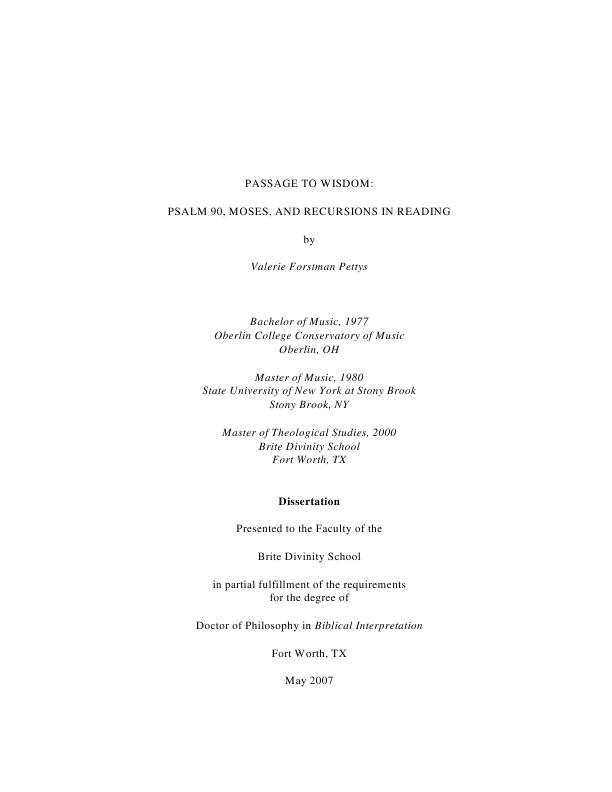Passage to wisdom: Psalm 90, Moses, and recursions in readingShow full item record
| Title | Passage to wisdom: Psalm 90, Moses, and recursions in reading |
|---|---|
| Author | Pettys, Valerie Forstman |
| Date | 2007 |
| Genre | Dissertation |
| Degree | Doctor of Philosophy |
| Abstract | This project is a rhetorical-intertextual study of Psalm 90. It is also a study of the act of reading as a recursive, self-reflexive, self-organizing, and emergent process. The language of Psalm 90 forms a content chiasm, which can be read as a two-part structure or as a triptych organized around human experiences of divine wrath and compassion. Unique allusion to Moses in the psalm's superscription and shared language with Exod 32:12 evoke a reading of this poetic structure in the shape of a mountain: a reinscribed Sinai. As the mountain of God, Psalm 90 becomes a space to be traversed. Beginning and ending in the open-endedness of God, reading ascends through a lament on themes of temporality and transience, life and death; passes through figurations of divine burning; and descends into an imperative world sated in the moment at hand by God.^To read Psalm 90 in this way is to return--with a difference.The readerly move brings other Sinai passages into play, elaborating a text more evocatively associated with the figure of Moses. It addresses a complex text with a reading process that is mobile, mutable, and relational in every sense. It provides for a reading of structure that enacts the change Psalm 90 reckons as wisdom while also suggesting a model for the linguistic construction of meaning. Recursion, a concept of non-identical repetition borrowed from complexity theory, generates the methodology and shape of this study. Seven chapters map the recursion in Psalm 90.^Five chapter tropes outline its order: "mountain," "law," "fire," "veil," and "words." These signs oversee a reading of the Psalter in the shape of Psalm 90 and of Exodus 32 as a paradigm for the law(s) given on that mountain; a reading of the 'peak' of Psalm 90 as the burning of the Holocaust and as the death of self figured in the language of Zen; a reading of Moses' final descent from Sinai in Exod 34:29-35 in relation to the 'descent' from Psalm 90; and a critical inquiry into a postmodern rhetorical criticism. |
| Link | https://repository.tcu.edu/handle/116099117/4012 |
| Department | Brite Divinity School |
| Advisor | Craven, Toni |
Files in this item
This item appears in the following Collection(s)
- Doctoral Dissertations [1526]
© TCU Library 2015 | Contact Special Collections |
HTML Sitemap



